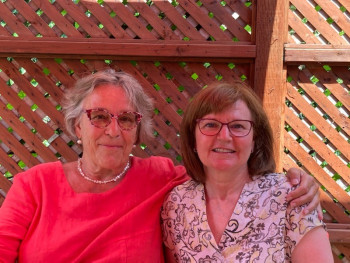Meeting the needs of young moms, then and now
To mark the 100th birthday of the Canadian Paediatric Society, the Retro-Doc Project takes an historic look back (and forward!) at formative CPS statements and subjects. This blog is the fourth in a series written by members with years of experience and a gift for the long view.
Posted on August 18, 2022 by the Canadian Paediatric Society | Permalink
Topic(s):
By Franziska Baltzer, MD, and Monica O’Donohue, RN
When I recently read the 1979 Canadian Paediatric Society position statement, The Adolescent Mother and her Baby, my first reaction was: “Wow!” How accurate, state-of-the-art this is, 43 years later!
And then came the next realization: How come we have not managed to implement the services for teen mothers recommended by the authors?
One major change has occurred: Teenage pregnancy dropped dramatically over the past decades, mainly due to information and access to birth control. While the number of pregnancies in Canada among adolescents 15 to 19 years was 25.9 per 1000 in 1991, that rate dropped to 17 in 2000, 13.2 in 2010, and 5.5 in 2020. While this trend is very positive, it does create challenges to offering adequate services for pregnant teens due to low numbers. Existing specialized services continue to be unknown among the many sources adolescents first turn to for help (e.g., a school nurse).
The Montreal Children’s Hospital, McGill University Health Centre, offered adolescent-centred obstetrical care even before the statement was written. When Dr. Elsa Quiros took over obstetrics in the late 1970s, she organized the multidisciplinary obstetrical care for teenagers (nursing individually as well as prenatal classes in groups, social service, dietician and obstetrical visit) all in one afternoon, held weekly. In 1992, we added a teen parent and child clinic with the same multidisciplinary team as well as a paediatrician so that the adolescent and young child could receive care together. For several years we even had a psychologist and an educator as well as a psychiatric consultant attached to the program, eventually stopped due to lack of funding.
With such a service, adolescents have time to build a trusting relationship with the professionals. Reaching out to the teen who misses an appointment is essential to ensure ongoing care.
Some research has since shown that the adapted obstetrical care for teenagers leads to very low rates of pregnancy, delivery and newborn issues (e.g., eclampsia, c-section, prematurity, low birth weight). One 2015 poster publication actually came out of our service (Tackling Teenage Pregnancy Together: The Effect of a Multidisciplinary Approach on Adolescent Obstetrical Outcomes).
While there is no need to re-write this statement in 2022, we might add a few more points:
- Never forget that for the teenager, pregnancy is a solution and not a problem. Therefore, an absolutely non-judgmental approach by all care takers is essential.
- Teenagers need time to establish a trusting relationship with health care professionals and to see that professionals can be helpful to them. Therefore, the caring team has more chances to be influential, if it remains stable over the time of the pregnancy and then throughout the first years of life of the baby: same nurse, same social worker, same educator or psychologist.
- Appointments during pregnancy as well as later for the baby need to be organized in the afternoon and around the medical visit (obstetrician, paediatrician, or family physician).
- Reach out to the adolescent, and call if needed several times to re-book missed appointments.
- Use a strengths-based but also a trauma-informed approach with adolescent parents.
Dr. Franziska Baltzer is a newly retired pioneer of adolescent medecine who practiced at the Montreal Children’s Hospital and McGill University, where she was Division Director of adolescent medicine for many years. She still works and teaches part time, and serves on the CPS Adolescent Health Committee.
Monica O’Donohue, RN, has taken care of pregnant teenagers and adolescent parents along with their children for the past three decades at the Adolescent Medicine/Gynecology Division of the Montreal Children’s Hospital, McGill University Health Care Centre, in Montreal.
Copyright
The Canadian Paediatric Society holds copyright on all information we publish on this blog. For complete details, read our Copyright Policy.
Disclaimer
The information on this blog should not be used as a substitute for medical care and advice. The views of blog writers do not necessarily represent the views of the Canadian Paediatric Society.
Last updated: Sep 12, 2022

